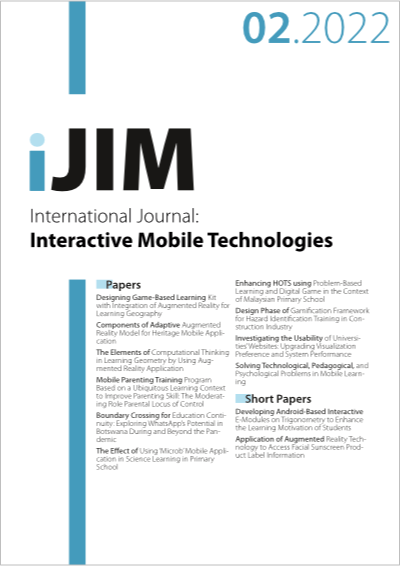Boundary Crossing for Education Continuity: Exploring WhatsApp’s Potential in Botswana During and Beyond the Pandemic
DOI:
https://doi.org/10.3991/ijim.v16i02.27283Keywords:
Botswana, boundary crossing, COVID-19, educational technology, m-learning, WhatsAppAbstract
Based on a conceptualization of WhatsApp as a boundary object that permits educational institutions to cross over from in-school teaching to out-of-school teaching, this study investigated the viability of WhatsApp as a mobile learning (m-Learning) technology tool for the continuity of teaching and learning in Botswana during and beyond the COVID-19 pandemic. Utilizing a narrative review of the literature, we found that WhatsApp’s viability is supported by Botswana’s high mobile phone penetration rate, the extensive coverage of the country’s mobile broadband network, reduced domestic internet prices and research findings of WhatsApp’s technological, educational and academic advantages elsewhere. However, teachers require training to develop relevant technological and pedagogical competences. WhatsApp’s viability also requires inclusive access for all children including those from rural poor families and living with disabilities, and the protection of children learning online from mobile phone dependency and exposure to potentially harmful content and abuse.
Downloads
Published
2022-01-28
How to Cite
Lyken-Segosebe, D., Gamariel, G., & Bagai, K. (2022). Boundary Crossing for Education Continuity: Exploring WhatsApp’s Potential in Botswana During and Beyond the Pandemic. International Journal of Interactive Mobile Technologies (iJIM), 16(02), pp. 59–81. https://doi.org/10.3991/ijim.v16i02.27283
Issue
Section
Papers
License
Copyright (c) 2021 Dawn Lyken Segosebe, Gladys Gamariel, Kelebonye Bagai

This work is licensed under a Creative Commons Attribution 4.0 International License.



